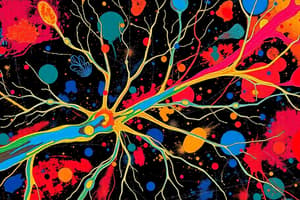Podcast
Questions and Answers
Which of the following statements about pain is true? (Select all that apply)
Which of the following statements about pain is true? (Select all that apply)
- Pain is an emotional reaction to actual or potential damage to the body.
- A person's pain can be objectively measured.
- Pain is an unpleasant sensation that signals actual or potential damage to the body. (correct)
- Pain is a normal consequence of aging.
Which is true of acute pain?
Which is true of acute pain?
- It usually lasts less than 1 month.
- It occurs more in older people.
- It generally gets better as the tissue heals. (correct)
- It generally lasts longer than 6 months.
Which is true of chronic pain?
Which is true of chronic pain?
- Older people often have at least one condition that causes chronic pain. (correct)
- It usually lasts less than 6 months.
- It is most often related to surgery.
- Nothing can be done about it.
Which of the following can be negatively impacted by the presence of persistent pain?
Which of the following can be negatively impacted by the presence of persistent pain?
Pain tolerance refers to:
Pain tolerance refers to:
You are caring for Mrs. Davis, who has difficulty communicating due to a stroke. She is usually pleasant, but today when you attempt to help her out of her chair, she hits you. You should:
You are caring for Mrs. Davis, who has difficulty communicating due to a stroke. She is usually pleasant, but today when you attempt to help her out of her chair, she hits you. You should:
Which report about Mr. Jordon's pain has the most helpful information?
Which report about Mr. Jordon's pain has the most helpful information?
It is 2 a.m. and Mr. Owens complains to you that he cannot sleep because of pain. One thing that you can do on your own to help reduce his pain is:
It is 2 a.m. and Mr. Owens complains to you that he cannot sleep because of pain. One thing that you can do on your own to help reduce his pain is:
The nurse asks you to apply an ice bag to Mrs. Bowling's right foot. As you prepare for the procedure, you notice that Mrs. Bowling's right foot is cold to the touch and has purple discoloration. You should:
The nurse asks you to apply an ice bag to Mrs. Bowling's right foot. As you prepare for the procedure, you notice that Mrs. Bowling's right foot is cold to the touch and has purple discoloration. You should:
Flashcards are hidden until you start studying
Study Notes
Understanding Pain
- Pain is primarily described as an unpleasant sensation signalling actual or potential damage to the body.
- Subjective nature of pain makes it difficult to measure objectively.
- Pain can be an emotional reaction influenced by various factors.
Acute vs. Chronic Pain
- Acute pain generally improves with healing of tissue and usually lasts less than one month.
- Chronic pain often lasts longer than six months, frequently affects older adults, and is commonly associated with ongoing health conditions rather than surgery.
Impact of Persistent Pain
- Persistent pain can adversely affect multiple aspects of a person's life, including:
- Appetite
- Sleep quality
- Independence and daily functioning
Pain Tolerance and Experience
- Pain tolerance is defined as the maximum level of discomfort a person can endure before seeking relief.
- Awareness of pain occurs at different thresholds for individuals.
Behavioral Signs of Pain
- Changes in behavior, such as aggression or withdrawal, may indicate pain, especially in those who have communication difficulties.
- Recognition of such signs is crucial for timely intervention and reporting to medical professionals.
Effective Communication of Pain
- Descriptive feedback regarding pain, such as persistent complaints of "pins and needles," provides valuable information for caregivers.
- Specificity in reporting symptoms helps in the assessment and management of a patient's pain.
Non-Pharmacological Pain Management
- Engaging in conversation about pleasant topics can help distract patients from pain and provide comfort.
- Establishing a connection can prove beneficial in the management of acute pain episodes.
Safety Precautions in Pain Management
- Observe for any signs that may indicate complications, such as discoloration or unusual temperature variances in the affected body part, prior to treatment.
- Immediate reporting of concerning findings to nursing staff is essential to ensure patient safety before proceeding with treatments like ice application.
Studying That Suits You
Use AI to generate personalized quizzes and flashcards to suit your learning preferences.




